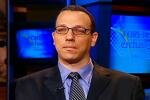
Dateline: March 23, 2007
George Soros speaking in Malaysia
Washington - The simmering debate over American policy toward Israel and the role of the Jewish community in shaping it exploded with near-nuclear force this week. Several of the nation's best-known international affairs commentators fired salvos at pro-Israel lobbyists and defenders of Israel fired back with unprecedented fury.
In the space of three days, major critiques of Jewish lobbying were published by controversial billionaire George Soros, Pulitzer Prize-winning columnist Nicholas Kristof, the respected British newsmagazine The Economist and the popular Web site Salon.
The replies were furious. The New York Sun accused Kristof and Soros of spreading a "new blood libel." The American Jewish Committee's executive director, David Harris, wrote in a Jerusalem Post opinion article that Kristof had a "blind spot" and had "sanctimoniously lectured" Israel.
The editor of The New Republic, Martin Peretz, renewed an attack on Soros that he began a month ago when he called the Hungarian-born Holocaust survivor a "cog in the Hitlerite wheel."
The outburst over Middle East policymaking was triggered in part by the annual Washington conference last week of the pro-Israel lobbying powerhouse, the American Israel Public Affairs Committee, a highly publicized event that put the issue of pro-Israel influence in the media spotlight. A parade of politicians and presidential candidates came to the conference to declare their unwavering support for Israel, while the lobby itself reaffirmed a hard-line agenda that included cutting all American ties with the new Palestinian government.
At the same time, the latest attacks and counterattacks were also a continuation - and an escalation - of an ongoing debate in Washington over the purported role of the pro-Israel lobby in shaping American policy in the Middle East and stifling debate. Those attacks reached a peak of venom last year with the publication of a contentious document by two senior political scientists, Stephen Walt of Harvard and John Mearsheimer of the University of Chicago, who charged that a sprawling, powerful "Israel Lobby" had pushed the United States into war with Iraq.
Among the latest group of critics, Soros, the billionaire philanthropist and currency trader, was the harshest. In an article in The New York Review of Books, published Monday, he argued that the United States is doing Israel a disservice by allowing it to boycott the Hamas-Fatah Palestinian unity government and to turn down the Saudi peace initiative. But, he wrote, there is no meaningful debate of such policies.
"While other problem areas of the Middle East are freely discussed, criticism of our policies toward Israel is very muted indeed," Soros wrote. He added that pro-Israel activists have been "remarkably successful in suppressing criticism."
Soros singled out Aipac as a key source of the problem, accusing the lobby of pushing a hawkish agenda on Israeli-Palestinian issues. "Aipac under its current leadership has clearly exceeded its mission, and far from guaranteeing Israel's existence, has endangered it," he wrote.
Soros's article was noteworthy in part because it broke his longstanding practice of avoiding public identification with Jewish causes. While he has given hundreds of millions of dollars in the past decade to democratization in the former communist bloc, he has given almost nothing to Jewish causes. In this week's article, however, he stated - apparently for the first time - that he has "a great deal of sympathy for my fellow Jews and a deep concern for the survival of Israel."
He said that while he has disagreed with Israeli policies in the past, he has kept quiet because he "did not want to provide fodder to the enemies of Israel." However, he said, the mishandling of recent events by Washington and Jerusalem now demanded greater public debate, which he said was stifled by groups like Aipac.
He also sprang to the defense of his fellow Jewish liberals, criticizing a recent essay on "Progressive Jewish Thought," written by Indiana University historian Alvin Rosenfeld and published by the American Jewish Committee, for its attack on critics of Israel.
Soros wrote that he is "not sufficiently engaged in Jewish affairs to be involved in the reform of Aipac" and called on the American Jewish community "to rein in the organization that claims to represent it."
A spokesperson for Aipac said the group will not comment on Soros's remarks.
An argument echoing Soros's was posted a day later on the popular Web site Salon, in an article titled "Can American Jews unplug the Israel lobby?" The writer, Gary Kamiya, called on American Jews to "stand up and say 'not in my name'," and to challenge the notion that Aipac's views are representative of the broader Jewish community.
Less pointed, but far more widely circulated, was a critique of American policymaking published Sunday by New York Times opinion columnist Nicholas Kristof. The much-decorated journalist, famous for his determined coverage of the Darfur genocide, argued that American politicians have "muzzled themselves" when it comes to Israel and that "there is no serious political debate among either Democrats or Republicans about our policy toward Israelis and Palestinians."
Both Kristof and Soros compared America's Middle East policy discussion unfavorably with the lively debate in Israel over the government's policy. Both claimed that while Israelis feel free to criticize their government and question its policies, American politicians are afraid to take it on.
The Economist, the internationally respected British newsweekly, summed up Friday in a prescient article the "changing climate" facing the pro-Israel lobby. It mentioned challenges to Aipac from Arab Americans, liberal Jews and foreign-policy experts worried about America's standing in the Arab world. "America needs an open debate about its role in the Middle East and Aipac needs to take a positive role in this debate if it is to remain such a mighty force in American politics," the article concluded.
This burst of criticism against the Israel lobby and its role in the shaping of American policy toward Israel was immediately met by critical articles from supporters of Aipac and of America's pro-Israel policies.
A Monday editorial in the New York Sun was the harshest of all. It compared Soros's and Kristof's criticisms to the so-called blood libels directed against Jews in medieval Europe. "The fact is that they write at a time when a war against the Jews is underway," the Sun wrote. "It is a war in which the American people have stood with Israel for three generations. The reason is that Americans are wise enough to understand which side in the war against the Jews shares our values - and to sort out the truth from the libels."
But Soros's greatest critic is no doubt New Republic editor Martin Peretz, who posted only a brief reaction on his blog to Soros's article, promising to elaborate when he returns from his trip abroad. Peretz had attacked Soros in February for saying that the United States would need "de-Nazification" after President Bush leaves office, charging that Soros himself had been guilty of collaborating with the Nazis as a teenager in Hungary. Soros replied in the magazine that the charge was false, and Peretz backed off somewhat. Now, however, he has promised to come back with guns blazing, after he returns from an overseas trip.
"Since he has picked the scab off his own wound this time, I will not be so kind this time," Peretz warned.
David Harris, executive director of the American Jewish Committee, also joined the debate in an opinion article in the Jerusalem Post. Harris praised Kristof's acclaimed foreign reporting but said he has a "blind spot" regarding Israel. He added that "Israel doesn't need lectures from well-intentioned journalists on the need for peace. Israel needs well-intentioned partners for peace."
The current round in the debate over the pro-Israel lobby is already spilling over into the political system. Presidential candidate Barack Obama, who was seen as being supported financially by Soros, distanced himself from the billionaire following Soros's article on Aipac.
"On this issue he and Senator Obama disagree," said a statement from the Obama campaign issued Tuesday. It is now unclear how willing Democratic candidates will be to accept campaign contributions from Soros, who is one of the biggest donors to Democratic-aligned advocacy groups.
While the debate is reaching a boiling point in the public sphere, work on the ground on establishing a new lobbying apparatus by dovish Jewish groups and individuals is moving at a much slower pace.
The initiative was initially called in media reports "the Soros lobby," after the financier attended an exploratory meeting last fall in New York to discuss creating a new lobby. Since that meeting, however, Soros has shown no further interest in the effort, organizers said.
"He met with us once and that's it," said Jeremy Ben-Ami, one of the main figures behind the initiative. Ben-Ami stressed that Soros has not yet pledged any funds for the new advocacy group and that the initiative is still in need of donors. Many in the group now refer to it jokingly as the "non-Soros lobby."
—N.G.
 Nathan Guttman is the Washington correspondent for the Israeli daily newspaper, the Jerusalem Post. Mr Guttman had previously served as the Washington correspondent for Ha’aretz. He has experience in both print and television journalism and holds a bachelor's degree in philosophy and a master's degree in contemporary Judaism from the Hebrew University of Jerusalem.
Nathan Guttman is the Washington correspondent for the Israeli daily newspaper, the Jerusalem Post. Mr Guttman had previously served as the Washington correspondent for Ha’aretz. He has experience in both print and television journalism and holds a bachelor's degree in philosophy and a master's degree in contemporary Judaism from the Hebrew University of Jerusalem.
